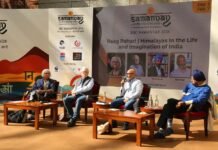The second annual two-day Media Rumble conference set off to an enthusiastic audience at the India Habitat Centre in New Delhi on 3 August 2018. This is the newspaper and media conference season with several in India itself including the upcoming WAN IFRA conference generally has the backing of the heavy metal printing giants. Then there is the 4-day INMA South Asia Festival this week in New Delhi. Thus when Media Rumble entered the media conference space last year there were several eyebrows raised – what is new?
A look at public policy and law making
The first event held last year, was a roaring success with four international journalists including Micheal Rezendes of The Boston Globe (the investigative journalist behind Spotlight, the Oscar winning film on sexual abuse in the Church) taking part. This year, we decided to meet Abhinandan Sekhri the CEO and co-founder of News Laundry who is also the co-curator of Media Rumble, to find out more about the two day festival. Before the event, we asked him, “What is Media Rumble and why is it really happening?”
“Whereas there are various media conferences, Media Rumble looks holistically at the the business of news from 360 degrees. Not only the rapidly changing technology perspective but also from the content angle and its monetisation,” responded Sekhri. “Importantly we also look at the Government policy and the laws that govern media. For example while there are structured laws and regulations for print and broadcast there are no specific laws for the fast changing digital media. This is largely due to the fact that rapid innovations have made the digital media landscape extremely fluid and difficult to regulate.” Sekhri told us that Media Rumble this year had 15 international speakers amongst the hundred odd speakers at the meet. “Tying up with Teamwork Arts helps us bring in the best international talent to the event and not let it be an inward looking naval gazing exercise,” says Sekhri.
Among the international media speakers at this year’s event was Francesca Panetta executive editor of virtual reality at The Guardian. An outstanding creative artist and multi-award winning digital journalist she shared some wonderful insights on the innovative world of virtual reality. Also present were Rafida Bonya Ahmed from Bangladesh the blogger widow of Avijit Roy who was killed by extremists, pro-democracy activist and journalist Iyad-el- Baghdadi who was evicted from the UAE after being arrested and jailed in 2014 and Maria Ressa the ex-CNN investigative reporter who fell out with the Philippines president and was accused of tax evasion and hounded by online trolls.
A large number of the sessions at the Stein Auditorium dealt with public policy, investigative journalism and the consequent confrontation with lawmakers. The dialogue session between media and Government failed to materialise because the Minister of State Col Rathore had to answer questions in the parliament and could not leave the parliament premises at the scheduled time. But the discussion on ‘patriotism versus journalism’ and ‘sleeping with the adversary’ added enough spice to the growing debate on freedom of press and censorship of media. There was an interesting session on the high cost of investigative journalism on day 2 with Shane Bauer, Josy Joseph, Marissa Kwiatkowski and Jay Mazoomdar moderated by Srinivasan Jain of NDTV.
Master classes for deep learning, films for expanding horizons.
The two-day program was carefully curated with several master classes by experts to provide deep learning experiences. The sessions started with understanding how to cover the parliament by Meghnad S and a workshop on data as a source by Rakesh Dubbudu that educated journalists on how to extract data for creating stories. A discussion between Raju Narisetti, Anushree Goenka and Praveen Gopal Krishnan explored the advertising media business model. Francesca Panetta discussed virtuality and reality with Durga Raghunath of the Indian Express in another session.
There were also some good films shown to the audience before discussion sessions. A breath taking film by celebrated photographers and father and daughter Raghu Rai and Avani Rai which was followed by an animated discussion with the creators and filmmaker Anurag Kashyap and Madhu Trehan editor in chief and co-founder of News Laundry. The two hour award winning film by Steven Spielberg ‘The Post’ on the fight for press freedom was shown on day two. There were sessions with Zakka Jacob, Gangadhar Patil , Meghna Gulzar, Suhasini Haider and Shereen Bhan among others.
The diverse mix of extraordinary films, master classes and technology, news and policy sessions make Media Rumble an interesting experience to look forward to in the years to come. What was unique about this conference was that it was not merely a conference for the insiders but invited the general public to engage with media and media concerns at a nominal entrance fee. It was clear that it rang a bell with concerned and veteran news addicts as well the next generation that get their news only from social media and smart phones.


















